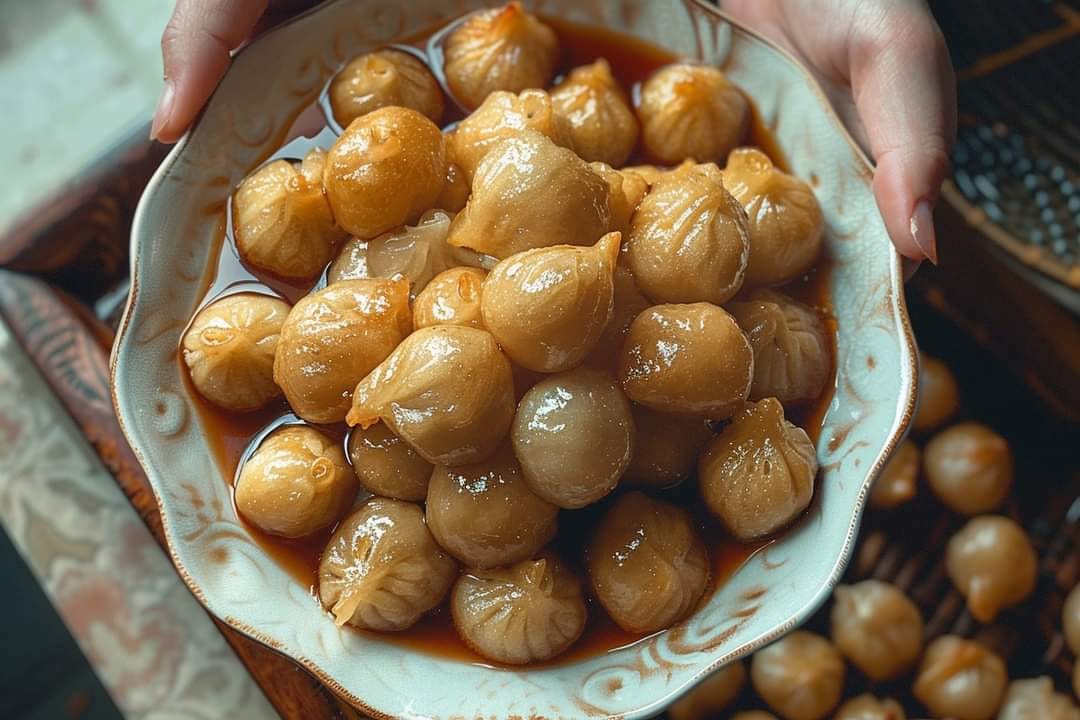Luqaimat, also known as sweet dumplings, are a popular Middle Eastern dessert that holds a special place in the culinary traditions of the region. These delectable little treats are especially beloved during the holy month of Ramadan, when they are often enjoyed to break the fast after sunset. The name “luqaimat” translates to “bites” or “small morsels” in Arabic, which perfectly describes these bite-sized delights.
Ingredients and Preparatio
3. **Frying:** The shaped dough is then deep-fried in hot oil until the dumplings turn a beautiful golden brown color. They should be crispy on the outside while remaining soft and airy on the inside.
4. **Soaking in Syrup:** Once fried, the hot dumplings are immediately soaked in a sweet syrup. The syrup is typically made by dissolving sugar in water and simmering it until it thickens slightly. Some variations add lemon juice for a hint of tanginess or rosewater for a floral note. The syrup should be warm but not boiling hot when the dumplings are soaked, allowing them to absorb the sweetness without becoming too soft.
5. Serving: Luqaimat are best enjoyed fresh and warm. They are often garnished with a sprinkle of sesame seeds, a drizzle of honey, or a dusting of powdered sugar for extra sweetness and visual appeal.
Cultural Significance and Variations
Luqaimat are more than just a sweet treat; they are a cherished part of Middle Eastern culture and hospitality. They are often served during festive occasions, family gatherings, and celebrations, symbolizing generosity and the joy of sharing good food with loved ones.
In addition to the traditional preparation, there are several regional variations of luqaimat across the Middle East and beyond:
– **Saudi Arabia:** In Saudi cuisine, luqaimat are sometimes flavored with saffron and cardamom, giving them a distinctive aroma and color.
– **Emirati Cuisine:** In the United Arab Emirates, the dumplings may be garnished with date syrup or dusted with dried coconut for a unique twist.
– **Indian and Pakistani Cuisine:** Similar sweet dumplings known as “gulab jamun” are popular, made from milk solids and soaked in a rose-scented syrup.
Ingredients:
- 2 cups all-purpose flour
- 1 teaspoon instant yeast
- 1 tablespoon sugar
- 1/4 teaspoon salt
- 1 1/4 cups warm water
- 1 tablespoon vegetable oil
- 1 tablespoon powdered milk
- 1/2 teaspoon cardamom powder
- 1/4 teaspoon saffron threads
- Vegetable oil for frying
- Date syrup or honey for drizzling
- Sesame seeds for garnish
Directions:
In a large bowl, combine the flour, instant yeast, sugar, salt, powdered milk, cardamom powder, and saffron threads.
Gradually add warm water and vegetable oil to the dry ingredients, mixing until a smooth and thick batter forms. Cover the bowl with a damp cloth and let it rest in a warm place for 1-2 hours, or until the batter has doubled in size.
Heat vegetable oil in a deep frying pan over medium heat.
Using a spoon or your hands, drop small portions of the batter into the hot oil, forming round dumplings. Fry the dumplings until they are golden brown and crispy, turning occasionally to ensure even cooking. This should take about 3-4 minutes per batch.
Remove the fried dumplings with a slotted spoon and place them on paper towels to drain excess oil.
Drizzle the luqaimat with date syrup or honey and sprinkle with sesame seeds before serving.
Prep Time: 15 minutes | Cooking Time: 20 minutes | Total Time: 35 minutes
Kcal: 120 kcal per dumpling | Servings: 24 dumplings

